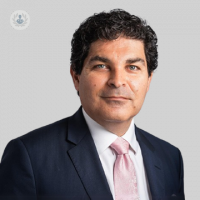Silent signals: Early signs of hearing loss you shouldn't ignore
Written in association with:Hearing loss often develops slowly, making it easy to miss the early signs or believing them to be just temporary or part of getting older.
Mr Behrad Elmiyeh, leading consultant ENT and nasal plastic surgeon, provides an expert insight into hearing loss, exploring its silent signs and why it’s important to act on them early.

What are the early signs of hearing loss?
Hearing loss often develops slowly, which makes it difficult to notice the subtle changes.
One of the early signs of hearing loss is difficulty understanding speech in noisy environments, such as restaurants or social gatherings, where you may frequently ask others to repeat themselves or lean in to catch what they’re saying.
Another sign is turning up the volume on devices like the TV, phone, or radio more than others in your household. You may also notice that the sounds themselves start to feel muffled or distant, as if people are mumbling even when they aren’t.
Additionally, hearing high-pitched consonants like "s," "t," "f," and "th" may become more challenging as your hearing loss progresses, which can lead to confusion or misunderstandings in conversations.
Why is it important to address early hearing loss?
Hearing loss is often progressive, meaning it can worsen if left untreated, so taking action at the first sign is crucial to prevent further damage. Additionally, addressing hearing issues early can help maintain cognitive function, as the brain doesn’t have to work as hard to process sounds.
Untreated hearing loss can also lead to social isolation, making conversations difficult and contributing to depression and anxiety. Treating hearing loss promptly helps maintain social connections and emotional wellbeing.
Above all, early intervention can significantly improve your quality of life, allowing you to enjoy activities and attend social events with greater ease and enjoyment.
What treatment options are available for hearing loss?
The treatment for hearing loss varies depending on its type and severity. There are several options available, including:
- Hearing aids
Hearing aids are the most common treatment for mild to moderate hearing loss. These small devices amplify sound, making it easier to participate in conversations and hear environmental sounds. Modern hearing aids are also discreet, customisable, and can be adjusted to suit individual hearing needs.
- Cochlear implants
For severe or profound hearing loss, cochlear implants may be an option. These are surgically implanted devices that bypass damaged parts of the ear and directly stimulate the auditory nerve.
- Surgery
For certain types of conductive hearing loss (where sound can’t pass through the outer or middle ear), surgical procedures may be recommended. This could involve repairing the eardrum or removing growths that block the ear canal.
How can I prevent hearing loss from worsening?
While some forms of hearing loss are inevitable due to ageing, many preventive measures can help protect your hearing or slow down the progression of your hearing loss.
To protect your hearing, it’s important to safeguard your ears from excessive noise exposure, which is a leading cause of hearing loss. In noisy environments like concerts, industrial workplaces, or when using power tools, for example, wearing earplugs or earmuffs is crucial.
Additionally, be cautious with the volume levels when listening to music through headphones or earphones by following the 60/60 rule: limit the volume to a maximum of 60% and limit listening sessions to no more than 60 minutes at a time.
Lastly, regular hearing check-ups are essential, especially if you're at risk for hearing loss due to age, noise exposure, or family history. Annual hearing tests are recommended to detect any issues early.
If you would like to book an appointment with Mr Behrad Elmiyeh, head on over to his Top Doctors profile today.


